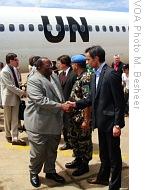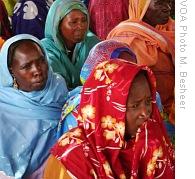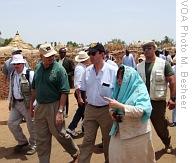VOA标准英语2008年-UN Security Council: African Visit Very Product
搜索关注在线英语听力室公众号:tingroom,领取免费英语资料大礼包。
(单词翻译)
By Margaret Besheer
United Nations
18 June 2008
U.N. Security Council ambassadors back from a mission to five African countries say their trip was productive and gave them an opportunity to personally see the situation in several troubled regions. VOA's Margaret Besheer has more on their trip from U.N. headquarters in New York.
 |
| The UN Delegation1 arrives in Southern Sudan |
Envoys2 representing all 15-members of the council traveled to Africa for 10 days earlier this month. They visited Djibouti, Sudan, Chad, Congo and Ivory Coast, logging more than 21,000 kilometers across the continent.
The council had hoped to go to Somalia to meet with members of the Transitional Federal Government and the opposition3, but security concerns made that impossible. Instead, they traveled to Djibouti, where the second round of U.N.-sponsored talks between the Somali parties were going on.
South African Ambassador Dumisani Kumalo, who co-led that part of the trip with Britain's U.N. Ambassador, said the council came away with a clear understanding of the main issue among all the parties, which is the presence of Ethiopian troops in their country.
"This was made very clear by the president of transitional government, who had invited the Ethiopian troops, that the Ethiopian troops are playing an important role of maintaining security in Somalia," he said. "However, both government and opposition parties foresaw a time when these troops would leave after the security situation in Somalia had improved."
Kumalo said that if the parties come to a political agreement and security improves, the council would consider authorizing4 a U.N. peacekeeping mission to take over from the small force of African Union troops in Somalia.
From Djibouti, the council went to Sudan, stopping first in the southern capital, Juba, where they met with regional president Salva Kiir. They continued to Khartoum for a closed-door meeting with President Omar al-Bashir.
British Ambassador John Sawers said the council came away convinced they have to do all they can to support the parties in implementing5 the fragile north-south peace agreement that ended Sudan's 20 year civil war in 2005.
The delegation also pressed President Bashir to be more helpful in facilitating the deployment6 of 26,000 U.N. peacekeepers (known as UNAMID) to Darfur. Sawers said they won some concessions7 from Khartoum, but more needs to be done.
"I can say some progress has been made on UNAMID, but much more needs to be done," he said. "The political process is badly in need of new energy. The humanitarian8 and security situations continue to worsen."
 |
| Chadian IDPs gave first-hand accounts to the UN envoys |
The delegation briefly9 visited a camp for displaced persons in Darfur, before moving on to neighboring Chad.
There the envoys also visited camps in the eastern part of the country, along the border with Darfur. One camp housed displaced Chadians and the other sheltered Darfurian refugees who fled across the border to escape militias10 and the Sudanese army in their villages.
French Ambassador Jean-Maurice Ripert led that part of the mission and described his encounter with some of the camp residents. He is heard here through a translator:
 |
| Ambassadors Ripert and Wolf tour a camp for Darfurian refugees in Chad |
"I spoke11 with numerous people and they said villages had been victims of aerial bombardment," he said. "Refugees as well as IDPs [internally displaced persons] had said acts of violence had taken place regularly in the camps - there were rapes12, recruitment of child soldiers, and so on. There were groups of women who complained of a very large number of sexual violence acts."
He said the camp residents did not say where the armed militias had come from, but they asked the council to improve their security.
A meeting scheduled with Chadian President Idriss Deby was canceled at the last minute when he did not turn up. Ambassador Ripert said Mr. Deby offered to meet the council the following day, but they had to refuse because they had an appointment with President Joseph Kabila in the Congo.
Ripert said the meeting in Kinshasa with President Kabila and other officials was very positive. The delegation also traveled to the town of Goma in eastern Congo to visit a U.N.-run camp for internally displaced persons.
The final stop on the council's tour was Ivory Coast, where the ambassadors met President Laurent Gbagbo. They discussed various aspects of the implementation13 of the Ougadougou peace agreement, including logistical preparations for the planned November 30 presidential election. President Gbagbo assured the Security Council that his government plans to hold the election on schedule.
 收听单词发音
收听单词发音 




